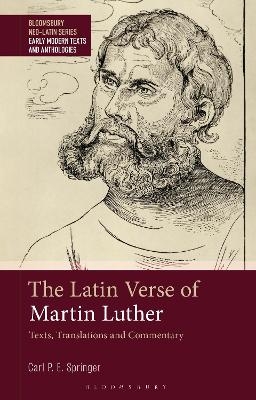
The Latin Verse of Martin Luther
Texts, Translations and Commentary
Seiten
2025
Bloomsbury Academic (Verlag)
978-1-350-26149-5 (ISBN)
Bloomsbury Academic (Verlag)
978-1-350-26149-5 (ISBN)
- Noch nicht erschienen (ca. Januar 2025)
- Versandkostenfrei innerhalb Deutschlands
- Auch auf Rechnung
- Verfügbarkeit in der Filiale vor Ort prüfen
- Artikel merken
Martin Luther wrote a number of Latin poems, mostly using traditional classical metres, over the course of his career. He used them to praise friends, insult adversaries and express his faith in times of distress. Up until now, Luther’s Neo-Latin poetry has largely fallen through the disciplinary cracks. Literary scholars have traditionally paid more attention to the Latin verse of more celebrated humanist poets such as Petrarch. Students of the Reformation have concentrated far more often on Luther’s prose and his famous German hymns than on his Latin poems. Even scholars who are familiar with Luther’s Neo-Latin poetry have dismissed it as of only marginal significance.
As this book demonstrates, Luther’s Latin verses are valuable cultural products that amply reward scholarly reconsideration. Springer’s volume is the first to provide English translations of all of them. It also includes extensive introductions and line-by-line annotations for each of the poems, situating them within their literary traditions and contemporary contexts. As such, it enables readers to see that far from being a reformer who more or less repudiated the Classics, or someone who merely dabbled in them, Luther was a confident, even bold, Latin poet, who was serious about working out his own distinctive synthesis between Christianity and the language and literature of the ancient Romans.
As this book demonstrates, Luther’s Latin verses are valuable cultural products that amply reward scholarly reconsideration. Springer’s volume is the first to provide English translations of all of them. It also includes extensive introductions and line-by-line annotations for each of the poems, situating them within their literary traditions and contemporary contexts. As such, it enables readers to see that far from being a reformer who more or less repudiated the Classics, or someone who merely dabbled in them, Luther was a confident, even bold, Latin poet, who was serious about working out his own distinctive synthesis between Christianity and the language and literature of the ancient Romans.
Carl P. E. Springer is SunTrust Chair of Excellence in the Humanities and Professor in the Department of Modern and Classical Languages and Literatures at the University of Tennessee-Chattanooga, USA. He is author of Luther’s Rome/Rome’s Luther (2021), Cicero in Heaven (2017) and Luther’s Aesop (2011).
Acknowledgements
Abbreviations
Chapter One: Introduction
Chapter Two: Psalmody
Chapter Three: Virgiliana
Chapter Four: Invective, Scatology and Satire
Chapter Five: Martial
Chapter Six: Inscriptions and Dedications
Chapter Seven: Faith and Life
Notes
Appendices
Bibliography
Index
| Erscheint lt. Verlag | 9.1.2025 |
|---|---|
| Reihe/Serie | Bloomsbury Neo-Latin Series: Early Modern Texts and Anthologies |
| Verlagsort | London |
| Sprache | englisch |
| Maße | 138 x 216 mm |
| Themenwelt | Literatur ► Klassiker / Moderne Klassiker |
| Geisteswissenschaften ► Geschichte ► Regional- / Ländergeschichte | |
| Geisteswissenschaften ► Sprach- / Literaturwissenschaft ► Anglistik / Amerikanistik | |
| Geisteswissenschaften ► Sprach- / Literaturwissenschaft ► Literaturwissenschaft | |
| ISBN-10 | 1-350-26149-1 / 1350261491 |
| ISBN-13 | 978-1-350-26149-5 / 9781350261495 |
| Zustand | Neuware |
| Haben Sie eine Frage zum Produkt? |
Mehr entdecken
aus dem Bereich
aus dem Bereich
Universalgelehrter, Polarreisender, Entdecker
Buch | Hardcover (2024)
mareverlag
28,00 €


